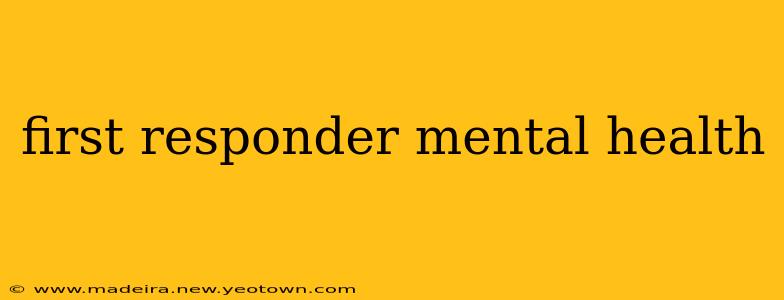The flashing lights, the sirens, the adrenaline rush – these are the images often associated with first responders. But behind the brave faces and unwavering dedication lies a hidden struggle: the significant impact of trauma and stress on their mental health. This isn't just a story; it's a crisis demanding our attention and understanding.
It's easy to overlook the emotional toll on those who rush towards danger, putting themselves on the line to protect us. They witness horrors most of us can't imagine, facing death, injury, and unimaginable human suffering on a daily basis. This constant exposure creates a unique set of challenges, leading to a higher prevalence of mental health conditions like PTSD, anxiety, and depression compared to the general population.
What are the common mental health challenges faced by first responders?
This is a crucial question, and the answer isn't simple. The experiences of police officers, firefighters, paramedics, and other first responders vary, yet they share a common thread: prolonged exposure to trauma. This can manifest in several ways:
-
Post-Traumatic Stress Disorder (PTSD): Intrusive thoughts, flashbacks, nightmares, avoidance behaviors, and emotional numbness are hallmarks of PTSD, a condition significantly impacting first responders. The constant exposure to traumatic events can overwhelm the brain's coping mechanisms.
-
Anxiety Disorders: The high-pressure environment and constant threat of danger contribute to widespread anxiety. First responders may experience excessive worry, panic attacks, and difficulty relaxing.
-
Depression: Feeling hopeless, helpless, and losing interest in activities once enjoyed are common symptoms of depression. The cumulative stress of the job, combined with potential burnout, can lead to significant depressive episodes.
-
Substance Abuse: Sadly, self-medication through alcohol or drugs is a concerning reality for some first responders. This attempt to cope with the emotional burden can lead to further complications.
-
Burnout: This state of emotional, physical, and mental exhaustion is a significant risk for those constantly facing high-stakes situations. The feeling of being overwhelmed and depleted can severely impact job performance and overall well-being.
How prevalent are mental health issues among first responders?
Studies consistently show alarmingly high rates of mental health issues among first responders. Precise figures vary depending on the study and the specific group of responders, but the consensus points to a significantly higher prevalence than the general population. This underlines the urgent need for proactive mental health support systems.
What are the barriers to seeking help for mental health issues?
Even with the awareness of the problem, many first responders face significant barriers to seeking help. These include:
-
Stigma: A deeply ingrained culture of stoicism and self-reliance can prevent first responders from acknowledging their struggles and seeking professional help. They may fear being seen as weak or incompetent.
-
Fear of Reprisal: Concerns about job security or career advancement can deter individuals from disclosing their mental health challenges.
-
Lack of Access to Care: Limited access to mental health services tailored to the unique needs of first responders can create a significant hurdle.
-
Difficulties with Confidentiality: Concerns about confidentiality within their workplace or within the wider community can be a powerful deterrent.
What resources are available to first responders struggling with mental health?
Fortunately, there's growing recognition of the need for specialized support. Several organizations offer resources and programs designed to address the unique mental health needs of first responders. These include peer support programs, confidential helplines, and specialized therapy services. More needs to be done, but the resources are growing and becoming more accessible.
How can we improve mental health support for first responders?
Creating a supportive and understanding environment is paramount. This requires a multi-pronged approach:
-
Reducing Stigma: Open conversations, education, and leadership support are crucial to dismantling the stigma surrounding mental health within first responder communities.
-
Improving Access to Care: Ensuring easy access to specialized mental health services, including readily available and confidential support networks, is essential.
-
Implementing Peer Support Programs: Connecting first responders with others who understand their experiences can be invaluable.
-
Promoting Self-Care Strategies: Encouraging healthy lifestyle choices and providing resources for stress management techniques are critical for long-term well-being.
The mental health of our first responders is not just a matter of individual well-being; it's a societal responsibility. By acknowledging the challenges, providing adequate support, and fostering a culture of care, we can ensure that those who protect us have the help they need to safeguard their own mental health. The silence must be broken. The battle is real, and it's one we must fight together.

